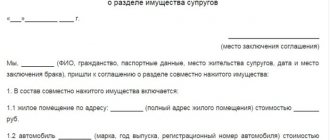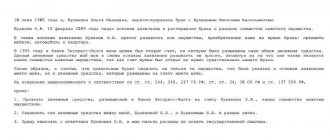In accordance with current legislation, values that were acquired by citizens while in a family union are considered jointly acquired. The exception is property that was received by spouses as a result of a gratuitous transaction (donation, inheritance) - it is not subject to division unless the 2nd spouse proves that he invested funds and effort, after which the value of the object increased significantly (for example , built a house on a donated plot or made major renovations to the premises). But can one of the spouses formalize a waiver of property during a divorce?
Types of property relinquishment during divorce
There are two main options for abandoning property: passive and active.
Passive abandonment of property
Strictly speaking, this is not a refusal in the literal sense of the word, but simply a reluctance to draw up any documents. As a result, each spouse remains “with their own,” that is, with those objects that are registered in their name.
Example : During marriage, Vasily registered all property in the name of his wife. During the divorce, Vasily decides that he does not need anything and simply stops demanding his share. 3 years pass (the statute of limitations) and the ex-wife can safely carry out any actions with the property that was previously considered jointly acquired.
Advantages and disadvantages
The main advantage: there is no need to prepare documents and pay state fees. However, this is only possible if both parties are interested in such a passive version of the division. Otherwise, either spouse can file a claim in court demanding a forced division of all property acquired jointly.
The main drawback: the suspended state of the property. The spouse who ultimately receives all or most of it turns out to be virtually unable to perform any actions with the property for fear that the other party may make claims at any time. And this situation continues until the expiration of the statute of limitations.
Active abandonment of property
It is by active renunciation of property that we mean drawing up an agreement between spouses on renunciation (or receipt, as it is also called).
Advantages and disadvantages
Advantage: a clear understanding of who owns what, with the ability to immediately make full use of the property, including its sale, modernization or reconstruction.
Disadvantage: the need to draw up documents with a notary and pay a state fee.
Ways to abandon jointly acquired property
The refusal is issued taking into account the following principles:
- voluntariness;
- Only a legally capable spouse can apply;
- may be drawn up during a marriage in relation to a specific property or after a divorce in relation to all property;
- Notarized approval is required.
Table No. 1 “Methods of formalizing a refusal decision”
| Form | Peculiarities |
| Marriage contract | Before registering a marriage, partners can enter into a prenuptial agreement - a bilateral agreement that provides for the procedure for dividing material wealth that the spouses will have in the future. A man and a woman can also enter into a contract during marriage for newly acquired property. In the contract, the spouses independently determine the order of division of material wealth during a divorce. It is permissible for one partner to renounce valuables in favor of the second participant |
| Pre-trial settlement agreement | In the event of a divorce, after receiving a certificate of termination of marriage, the spouses can draw up a settlement agreement, determining the procedure for dividing property. A couple can divide benefits among themselves, determine the shares of common children in joint property, formalize the renunciation of material assets without conditions or in favor of a specific person. Disadvantage – there is a risk that the contract will be declared void in the future |
| Judicial agreement | After the start of the trial, the parties have the right to file counterclaims, file motions, and request a postponement of the consideration of the dispute in order to sign a settlement agreement.
|
| Gift deed | Refusal is always associated with the risk that the spouse will try to regain lost rights in the future. This is fraught with legal expenses and lengthy property disputes, so an alternative solution is a deed of gift. Donation is the transfer of material goods free of charge. The agreement is voluntary and allows the husband/wife to gift property to a second partner or child |
Consequences of abandoning property
The legislation establishes the following legal consequences of voluntary deprivation of material wealth:
- inability to claim values in the future;
- prohibition on filing a lawsuit if the refusal was previously accepted by the court;
- deprivation of the right to dispose and use property.
How to formalize a waiver of property during a divorce
The first thing to remember is that agreements of this kind cannot be oral. No matter how much one party wants to give up the jointly acquired property, they cannot simply say, “Everything remains to you.” Even if these words are recorded on a voice recorder or video camera, you can later refuse them, stating that they were said under duress or in a state of passion.
The only thing that can be done verbally is to talk with the second spouse about the status of various objects and agree on who will refuse what. But after this, all agreements must be included in the agreement and notarized. Otherwise, the document will not be valid and the ownership order can still be challenged.
There are two main types of property relinquishment agreements.
Agreement
In this case, upon divorce, the spouses enter into an agreement in which one of them completely renounces any claims to the property and transfers it to the other party.
Settlement agreement
This is an analogue of the same agreement, but drawn up and concluded during the trial process. It may be relevant if, when considering the case, it becomes obvious to one of the spouses that he will not receive anything anyway. In this situation, a settlement agreement is simply a way to end the trial early with a result that suits both parties.
Example : A wife claims the property of her ex-husband, but during the consideration of the case it turns out that he bought all the things with personal funds received as an inheritance. They are considered personal property and cannot be divided. In this case, she can enter into a settlement agreement to renounce claims to this property.
Giving up one property does not imply giving up absolutely everything acquired jointly, and in the future you can continue to try to divide objects not specified in the agreement.
Formalization of the agreement
First of all, it should be noted that citizens can issue a regular receipt in which one of the spouses expresses his will regarding the abandonment of property. However, this kind of document (receipt) is not subject to mandatory execution, and therefore it is recommended to prepare an agreement if the parties have concerns that the agreement will not be observed. But how to draw up an agreement correctly and does it need to be certified by a notary?
Preparation of the agreement
The parties (spouses) have the right to prepare an agreement on refusal either independently or with the help of third-party help - lawyers, attorneys, or specialists from a notary office.
When turning to specialists for compilation, please note that this service is paid and depends on the tariffs set by a specific specialist. If citizens prepare the agreement on their own, then they will only need to pay funds for the certification service - in accordance with the tariffs of the notary’s office. However, in this case, the possibility of making mistakes cannot be ruled out, which may subsequently lead to the invalidity of the document. If they are compiled on their own, citizens can find a sample online or a ready-made form, where all they have to do is enter the required information.
As a rule, the agreement to relinquish property includes the following information:
- Date (day/month/year) of document execution, as well as place (name of locality).
- Data about the parties (spouses - current or former): full name, citizenship, passport information (series, number, date of issue and name of the authority that issued it), date and place of birth, place of residence.
- Date and place of registration (dissolution) of the family union.
- List of property related to joint property.
It is important to take into account that when describing values, it is necessary to indicate their detailed characteristics.
So, if we are talking about a real estate property, for example, an apartment, then you will need to indicate: the full address (country, region, locality, street, house, apartment), as well as its cost. If the list of common property of the spouses includes a motor vehicle, then you will need to indicate: the cost of the car, make, year of manufacture and registration number. If the spouses have a joint deposit, then you will need to indicate its amount, account number, name and address of the financial institution. Data on other property is indicated in the same way.
The agreement will also need to indicate:
- The shares of each spouse (that is, if one of the parties wants to give up their half, then this circumstance will need to be clarified).
- List of property transferred to each spouse.
- That the property in question under the agreement is transferred to the 2nd spouse voluntarily, without coercion. It is also necessary to confirm the fact that the parties are fully capable, as well as the fact that no restrictions are imposed on it, it is not sold, and so on.
- The number of copies in which the agreement is drawn up.
- Signatures of the parties.
The notary, in turn, must familiarize himself with the agreement, as well as other documents presented by the parties, namely:
- Passports.
- Documents for the property that is the subject of the agreement.
- Certificate of conclusion/termination of family relations.
Download the property abandonment agreement (sample)
If the documents submitted by citizens do not raise additional questions from the notary, he will certify the agreement.
Required documents
To draw up an agreement, the notary will need to present the following documents:
- The text of the agreement with the attached list of property that is planned to be abandoned.
- Passports of spouses or other identification documents.
- Certificate of marriage and divorce.
Usually there is no need to confirm ownership, since the agreement is voluntary, but it is still recommended to keep the title documents with you.
Receipt, agreement on renunciation of rights to property during divorce (sample)
The waiver document is called an “Agreement.” Receipt is a misnomer. The difference here is that an agreement is a document that both parties sign. A receipt is drawn up and signed by only one party. In this case, a receipt in the official sense of the word cannot be used, since the agreement is valid only if one of the parties renounces the property and the other agrees with it.
The agreement can be handwritten or typed. In addition, it is possible to print the form and fill in the blank lines manually, but this is rarely used.
It is recommended to compose a document in only one way: either write by hand or type on a computer. This minimizes the possibility of challenging it.
What the agreement should include:
- Name, date and place of compilation.
- Information about spouses.
- Fact of abandonment of property with a detailed list of it.
When drawing up an agreement, it is advisable to involve witnesses.
What is not affected by refusal?
Loans and any other debts cannot be waived, even if they are related to property that is renounced by one or the other party.
Example : A husband formalizes a waiver of property in favor of his wife. The property includes an apartment purchased with a mortgage. By law, the husband is obliged to continue to pay his part of the loan, although, of course, the spouses can agree with each other orally that the ex-wife will pay. You need to understand that such agreements do not have legal force and in the future the spouse has every right to demand compensation from her ex-husband for part of the expenses incurred to pay off the loan.
Section order
If we turn to civil legislation, it outlines the features of the division of property. In particular, it reads:
- Property that was acquired by citizens during marriage can be divided between them voluntarily by drawing up an appropriate agreement.
- If the parties cannot come to a voluntary agreement regarding the division of property, then they need to go to court by submitting an appropriate statement of claim.
Thus, if one of the spouses wants to voluntarily give up property (for example, a man in favor of his wife or vice versa) upon dissolution of a family union, then citizens are required to draw up an appropriate agreement.
Who cannot give up property
The following persons cannot refuse property:
- Suffering from serious illnesses that can affect the decision made.
- Being under pressure from others or being misled.
- Declared incompetent.
To be more precise, they can refuse, but such agreements will be declared invalid.
Example : The husband’s refusal of acquired marital property was drawn up when he was using psychotropic medications. After the end of treatment, the husband filed a lawsuit demanding that the agreement be declared invalid, since he was in an inadequate condition. If the husband can prove this, for example, by providing prescriptions from a doctor and receipts for the purchase of medicines, the document will be invalidated.
Is it possible to challenge an agreement on the division of property certified by a notary office?
In a number of cases, an agreement to renounce property is drawn up by citizens under the influence of emotions, as a result of which, after a certain period of time, many have a desire to return some of their things (objects).
But is it possible to challenge the agreement? Even an agreement that has been certified by a notary can be challenged, but only if there are compelling reasons.
Grounds for challenging the agreement
In order for the agreement to be cancelled, at least one of the following circumstances must occur:
- The document contains provisions that contradict current legislation.
- The document was drawn up fictitiously - that is, initially the spouses did not plan to comply with it, but were drawn up only in order, for example, not to pay debts from their own property.
- One of the spouses was declared incompetent at the time of execution of the document.
- The document affects property that does not belong to the spouses.
- The spouse, recognized by the court as having limited legal capacity, took part in signing the agreement, but the person appointed as the trustee did not provide permission for such actions (and this is a mandatory condition).
- One of the parties to the contract was under pressure, was misled about the consequences, or was not aware of its actions.
Who has the right to demand cancellation of the agreement?
First of all, it is important to note that not every person has the right to demand cancellation of the agreement, but only:
- Parties who took part in the signing (i.e. ex-spouses).
- Persons (legal/individual) who have a property interest that was damaged during the execution of the document.
If other citizens/organizations try to cancel the agreement, they will be given a completely legitimate refusal.
Procedure for challenging
If there are grounds listed above, the interested person must prepare a statement of claim, indicating in it:
- The name of the judicial authority to which the appeal is made.
- Details of the plaintiff and defendant (full name, residential address, contact telephone number).
- Document's name.
- Information that citizens were in a marital relationship (with reference to a supporting document), but dissolved it (data from a document confirming the termination of the family union).
- Information about the agreement (date of execution, information about the parties).
- Request to terminate the agreement (indicating the reasons why this should be done).
- List of attached documentation (copies of passports, agreements, certificates of termination of family relationships, etc.).
- Date of filing the claim and signature.
Download the statement of claim for invalidation of the agreement (sample/form)
After the claim is submitted to the judicial authority, it will be considered in the manner prescribed by law, and if the plaintiff manages to prove the existence of the valid reasons indicated by him, the agreement will be terminated. After termination of the agreement, it will be possible to divide the property – also through the court.
Read: The procedure for dividing a privatized apartment during a divorce
Statute of limitations
In the case of voluntary refusal of either spouse, the statute of limitations does not play a special role. However, it may be important in cases where it is necessary to invalidate the agreement or if the parties have taken the path of “passive” refusal.
A refusal drawn up in accordance with all the rules is almost impossible to challenge. Before agreeing to such actions, it is recommended to discuss all the specifics with our lawyers during a free consultation. In many cases, it will be more profitable to claim some part for yourself or to give up the property under certain conditions. We can not only advise, but actually help with paperwork or even represent your interests in court.
FREE CONSULTATIONS are available for you! If you want to solve exactly your problem, then
:
- describe your situation to a lawyer in an online chat;
- write a question in the form below;
- call Moscow and Moscow region
- call St. Petersburg and region
Save or share the link on social networks
- FREE for a lawyer!
Write your question, our lawyer will prepare an answer for FREE and call you back in 5 minutes.
By submitting data you agree to the Consent to PD processing, PD Processing Policy and User Agreement
Useful information on the topic
5
Statement of claim for divorce and division of property
If, upon divorce, the former spouses cannot agree on...
3
Statement of claim section of mortgage apartment
Divorce almost always means some kind of legal problem related to the division...
3
How to properly divide a non-privatized apartment between relatives
Non-privatized housing is not subject to direct division, since it is not...
How to divide a one-room apartment during a divorce
The division of a one-room apartment during a divorce can be voluntary or forced...
39
Registration of a car by inheritance after the death of the owner
A car is also property subject to inheritance. As in…
3
Division of business, LLC in case of divorce between spouses
Upon divorce, each of the former spouses is interested in fair...
Options for dividing property in marriage
The legal regime of joint property of partners does not allow them to independently dispose of it. Moreover, for each of the citizens the specific shares belonging to them are not determined. For this reason, spouses can demand the division of property assets at any time, and not just upon divorce.
Possible options for dividing joint assets during marriage include:
- conclusion of a marriage contract by a partner;
- voluntary agreement to change the legal status of property and distribute shares in it;
- judicial procedure for division of property.
Judicial procedure is applied only if the parties have not reached a general agreement on property issues.
The following features are typical for concluding a marriage agreement:
- the document must be certified by a notary office;
- the contract can determine the procedure for dividing not only existing property, but also future assets of the spouses;
- Unilateral refusal of accepted obligations is not allowed.
When drawing up a marriage contract, the parties have the right to independently determine the division procedure, including determining the specific shares of each of the partners, or registering the property as the property of one of them. If there is a valid marriage contract, its terms can be challenged only according to the general rules provided for civil transactions.
A voluntary agreement of citizens allows them, without the participation of a notary or court, to re-register ownership of any things or items included in the joint property. To do this, it will be necessary to carry out registration actions in relation to real estate, after which the agreements reached will be implemented in the form of title documents for each partner.






